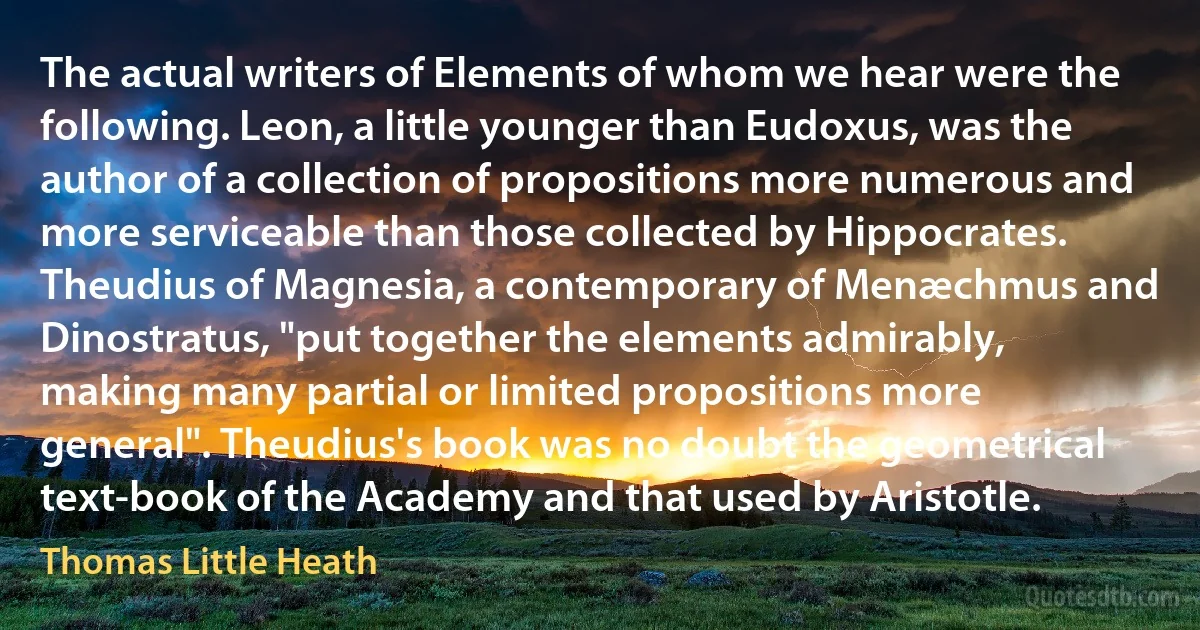Following Quotes - page 32
Returning home on leave following my second year at West Point, I called on a great-uncle who had joined the Confederate Army at the age of sixteen and had fought in a number of major Civil War battles, including Gettysburg, and had been with Robert E. Lee at Appamatox. My Uncle White was the younger brother of my grandfather. He hated Yankees and Republicans, not necessarily in that order, and talked derisively about both. When I visited, he was seated in a wheel chair, in grudging acquiescence to the infirmities of age. Tobacco juice decorated his shirt and stains around a spittoon on the floor testified to the inaccuracy of his aim. Flies buzzed through screenless windows. "What are you doing with yourself, son?" Uncle White asked. I answered the old veteran with trepidation. "I'm going to that same school that Grant and Sherman went to, the Military Academy at West Point, New York."

William Westmoreland
...In the following year AH 804 (AD 1402), he marched to Somnat, and after a bloody action, in which the Mahomedans were victorious, the Ray fled to Diu. Moozuffur Shah having arrived before Diu laid siege to it, but it opened its gates without offering resistance. The garrison was, however, nearly all cut to pieces, while the Ray, with the rest of the members of his court, were trod to death by elephants. One large temple in the town was razed to the ground, and a mosque built on its site; after which, leaving his own troops in the place, Moozuffur Shah returned to Puttun.

Firishta
...In the following year (AH 913, AD 1506), the king marched against Nurwur, a strong fort in the district of Malwa, then in possession of the Hindoos. The Prince Julal Khan governor of Kalpy, was directed to advance and invest the place; and should the Hindoos resist, he was required to inform the King... The King remained for the space of six months at Nurwur, breaking down temples, and building mosques. He also established a college there, and placed therein many holy and learned men.

Firishta
...He was firmly attached to the Mahomedan religion, and made a point of destroying all Hindoo temples. In the city of Mutra he caused musjids and bazars to be built opposite the bathing-stairs leading to the river and ordered that no Hindoos should be allowed to bathe there. He forbade the barbers to shave the beards and beads of the inhabitants, in order to prevent the Hindoos following their usual practices at such pilgrimages...

Firishta
On the 26th of Mohurrum, in the year AH 861 (AD Dec. 23, 1465), the King again proceeded to Mundulgur; and after a vigorous siege occupied the lower fort, wherein many Rajpoots were put to the sword, but the hill-fort still held out; to reduce which might have been a work of time but the reservoirs of water failing in consequence of the firing of the cannon, the garrison was obliged to capitulate, and Rana Koombho stipulated to pay ten lacks of tunkas. This event happened on the 20th of Zeehuj of the same year AH 861 (AD Nov. 8, 1457), exactly eleven months after the King's leaving Mando. On the following day the King caused all the temples to be destroyed, and musjids to be erected in their stead, appointing the necessary officers of religion to perform daily worship...

Firishta
I have a platform and a following of millions of people, many of whom I know have been through exactly what I have. And if I tell my story, as painful and flip floppy and flawed as it is, I know it will mean something to someone, as every time someone speaks openly about sexuality, it saves lives.

Dan Howell
Must Bantu and European in future develop as intermixed communities, or as communities separated from one another in so far as this is practically possible? If the reply is ‘intermingled communities', then the following must be understood. There will be competition and conflict everywhere. So long as the points of contact are still comparatively few, as is the case now, friction and conflict will be few and less evident. The more this intermixing develops, however, the stronger the conflict will become. In such a conflict, the Europeans will, at least for a long time, hold the stronger position, and the Bantu be the defeated party in every phase of the struggle. This must cause to rise in him an increasing sense of resentment and revenge.

Hendrik Verwoerd
Parallelism' can be pointed out in the different parts of a single object, looked at alone; it is even more obvious when one puts several objects of the same kind next to each other. Now if we compare our own lives and customs with these appearances in nature, we shall be astonished to find the same principle repeated... When an important event is being celebrated, the people face and move in the same direction. These are parallels following each other..

Ferdinand Hodler
The creation of the following paintings is to be imagined as follows: A person is sitting beside the sea. She is painting. A tune suddenly enters her mind. As she starts to hum it, she notices that the tune exactly matches what she is trying to commit to paper. A texts forms in her head, and she starts to sing the tune, with her own words, over and over again in a loud voice until the painting seems complete. Frequently, several texts take shape, and the result is a duet, or it..

Charlotte Salomon
I have been a vegetarian for a few years and just recently I have become a vegan ... I took this step following my inner feeling. ... If we think for a moment how man manages animals and what impact he has on animal world we could say he was not human at all. Just think of all slaughter houses and production of beef or poultry where conditions for animals are impossible. Animals are transported in lorries many times without any water, which is extremely cruel. It is not that people are bad, they just don't think about it. ... it is unreasonable to expect from people with lower levels of consciousness, who are cruel to animals, to end wars, to stop manipulating others, to help eradicate world poverty. In short as long as consciousness level is low all the disagreements in the world today will remain and possibly increase to the point of annihilation of humans.

Janez Drnovsek
Rather than following through on the proven crime and violence prevention techniques that work, we are back to tough-talking sound byte policies that have been proven to not only fail to reduce crime but actually increase crime, waste taxpayers' money and discriminate against minorities.

Bobby Scott
![I started [following a vegan diet] for health reasons. I was diagnosed with an autoimmune disease, and I wanted to maintain my performance on the court. Once I started I fell in love with the concept of fueling your body in the best way possible. Not only does it help me on the court, but I feel like I'm doing the right thing for me. ... I literally couldn't play tennis anymore, so it really changed my life. Because it was starting to take away what I loved, I had to make some changes, I had to change my life. Thankfully, I was able to find something that helped me get back to doing what I loved. ... It changed the pace that I live at. It changed everything. (Venus Williams)](https://cdn.quotesdtb.com/img/quotes_images_webp/50/venus-williams-able-best-964550.webp)


